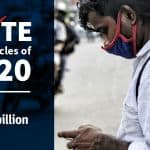Insights, Analysis and Debate: Vote for the Top NextBillion Article of 2019
Another year has come and gone, and it’s time for NextBillion’s annual tradition: Selecting our most influential article of the year. Our guest writers shared a lot of outstanding insights, opinions and analysis over the course of 2019, exploring many of the key issues, trends and debates that are shaping the future of impact-focused business. Their writing also highlights one of NextBillion’s primary roles in the sector: A third of these articles are from guest writers who responded to a viewpoint they read on the site – something we encourage, as part of our goal of facilitating informed debate around these issues.
With such a variety of views and insights, choosing the top article is a challenging task – and as usual, we’re turning to you, our readers, for help.
We’ve selected the 12 most-read articles of the year, listed in chronological order below, and we invite you to vote for the one that impacted your thinking the most. To vote, scroll to the bottom of the page and make your selection. You can vote up to 12 times during the two-week voting period, which runs from Dec. 20 to Jan. 2.
Read on for a short summary and link to each article – and feel free to share them widely. And as always, thank you for reading, contributing content to, and engaging with NextBillion. We couldn’t do what we do without your support, and we wish you a wonderful holiday season, and a happy and prosperous new year!
Some Good News on Climate Change
“While the world’s leaders were gathering at the United Nations Climate Change Conference in Poland in December, the streets of Paris looked like a war zone.” That’s the stark intro to “A Clean Alternative to Fossil Fuels: Could This New Renewable Energy Source Help Solve Climate Change?,” by Audun Sommerli Time at NextFuel AB. But the piece offers reasons for optimism, exploring how innovative clean technologies may represent the world’s best hope for fighting climate change.
Saving India’s Business Correspondent Model
The business correspondent model has shown great promise, bringing a network of tech-enabled banking agents into underserved communities in India to connect them with formal finance. But as researcher Moin Qazi explains in “India’s Business Correspondent Model is Revolutionary – and It’s Failing: Here’s How to Turn Things Around,” the approach is facing challenges that are undermining its considerable potential.
Is Financial Inclusion Really a Key to Achieving the SDGs?
There’s growing discussion about how financial inclusion can advance the Sustainable Development Goals – including in an optimistic NextBillion article from Leora Klapper at the World Bank last February. But according to Liz Larson at UNCDF and Daryl Collins at BFA, the evidence of a link between financial tools and development impacts has not been conclusive. In “Is Financial Inclusion Really Impacting the SDGs? This New Research Approach Could Offer an Answer,” a response to Klapper’s piece, they discuss a new measurement framework that aims to take account of the breadth of all potential and proven connections between financial services and the SDGs – while also offering a method for substantiating those impacts.
Don’t Believe the Financial Inclusion Hype
Researchers Phil Mader and Maren Duvendack also read Klapper’s NextBillion piece – and they also found themselves underwhelmed by the evidence of financial inclusion’s development impact. They push back sharply on the belief that “everyone gets access to financial services and – presto – the foundations for the SGDs will be laid” in their hard-hitting article, “Don’t Fall for the World Bank’s Bold Claims About Financial Inclusion and the SDGs,” based on their exhaustive review of existing research.
How SMEs Can Transform Africa’s Economy
Many predict that Africa will become a key player in the global economy in the coming decades. This transformation may still be 10-20 years away, but it’s coming, says Trevor Hambayi at Development Finance Associates – and the continent’s small and medium enterprises could play an important role. In “Why the Future is African – And Why SMEs Should Lead the Way,” he presents some of the unique challenges these enterprises face, and proposes some solutions that could help unlock their potential.
Scandal Hits Impact Investing
In one of the biggest impact investing stories of the year, Rise Fund co-founder and CEO Bill McGlashan’s involvement in the “Varsity Blues” college admissions scandal made national headlines – and sparked a wave of criticism of the sector. But according to Lauren Cochran at Blue Haven Initiative, while the critics have a point, they’re missing an important part of the story. She explores what McGlashan’s failings mean for the Rise Fund and the broader industry – and what impact investing can learn from it all, in “What the ‘Varsity Blues’ Scandal Says (And Doesn’t Say) About Bill McGlashan, the Rise Fund and Impact Investing.”
Supporting Gender Equality – In and Out of School
About 132 million girls are out of school around the world, and the problem is fundamentally tied to gender, due to issues ranging from child marriage to misperceptions about menstruation. In “The Impact of Equal Education: Solutions to the Gender Disparity in Sub-Saharan African Schools,” Mark Buttweiler at Bridge International Academies discusses one solution: a multifaceted approach to supporting equality both in the classroom and the surrounding community.
A Pivotal Choice for PAYGo Solar: Please Investors or Protect Customers?
Over $500 million in investor financing has poured into off-grid solar in the past year – but according to BrightLife CEO Stefan Grundmann, there is a downside. With PAYGo solar operators facing investor pressure to expand their reach and deliver greater sales, many have taken new measures to boost business – which has led to troubling new risks for customers. Grundmann explores this issue, and how the industry and its investors should respond to it, in “PAYGo Solar at a Crossroads: Why the Industry Must Choose Between Protecting Customers and Satisfying Investors.”
Dear Social Sector: Enough with the ‘Nudges’
The social sector has fallen in love with “nudges” – the practice of using small, behavioral science-based changes to subtly encourage everything from better hygiene to financial health. But Mariel Beasley at Common Cents Lab shares an uncomfortable truth in “Small Change: Why Behavioral Science Needs to Go Beyond ‘Nudges’ to Make a Real Impact”: Small tweaks usually mean marginal changes, and half-measures like nudges are leaving the true potential of behavioral science untapped.
Are Appliances the Key to Mini-Grid Sustainability?
Over 600 million Africans live without electricity, and mini-grids could be a solution. But the mini-grid business model is not yet sustainable – often due to low levels of energy consumption by rural customers who can’t afford to buy appliances that would increase their electricity usage. In “Low Energy Consumption = Unprofitable Mini-Grids. Is Appliance Financing the Answer?,” analysts at CrossBoundary present research on whether offering financing for household appliance purchases can help overcome this barrier.
An Impact Investor Critiques the ‘Africa Investment Frenzy’
It was a big year for venture capital investments in Africa – but not at Blue Haven Initiative. The firm’s ventures team made just one new investment in the region this year, leading some to wonder if they’d missed the boat. But as managing director Lauren Cochran argues in “Rethinking the ‘Africa Play’: Why We Held Back from the Africa Investment Frenzy,” it’s becoming clear that the growth-at-all-costs model other investors are adopting is not right for Africa, and investors should focus on building businesses that work in the long term.
To Investors Concerned About Africa’s ‘Investment Frenzy’: Look in the Mirror
When it comes to the “African investment frenzy,” Zoona co-founder Mike Quinn agreed with much of Lauren Cochran’s critique. But when she urged entrepreneurs to avoid the “growth-at-all-costs” approach to scaling and “the ego-boost of big rounds and press releases,” he stopped nodding and penned a response. Quinn argues that Cochran’s advice ignores a reality that many investors don’t recognize, and provides an entrepreneur’s perspective on the issue in “What’s Really Driving Africa’s ‘Investment Frenzy’?: An Entrepreneur Responds to Investor Concerns.”
James Militzer is the editor of NextBillion.
Sorry. This form is no longer available.
- Categories
- Education, Energy, Environment, Finance, Investing, Technology



